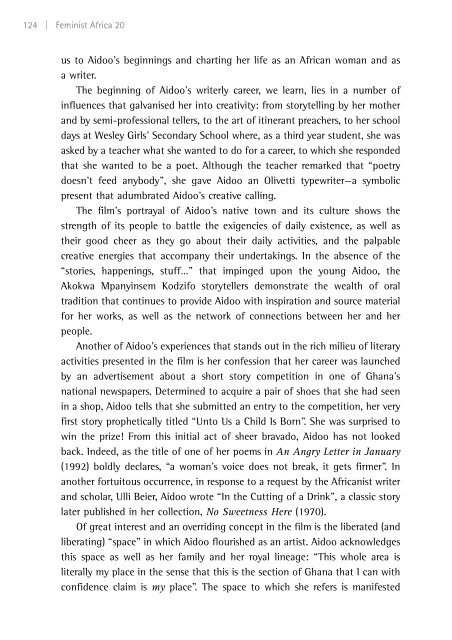Create successful ePaper yourself
Turn your PDF publications into a flip-book with our unique Google optimized e-Paper software.
124 | Feminist Africa 20<br />
us to Aidoo’s beginnings <strong>and</strong> charting her life as an African woman <strong>and</strong> as<br />
a writer.<br />
The beginning of Aidoo’s writerly career, we learn, lies in a number of<br />
influences that galvanised her into creativity: from storytelling by her mother<br />
<strong>and</strong> by semi-professional tellers, to the art of itinerant preachers, to her school<br />
days at Wesley Girls’ Secondary School where, as a third year student, she was<br />
asked by a teacher what she wanted to do for a career, to which she responded<br />
that she wanted to be a poet. Although the teacher remarked that “poetry<br />
doesn’t feed anybody”, she gave Aidoo an Olivetti typewriter—a symbolic<br />
present that adumbrated Aidoo’s creative calling.<br />
The film’s portrayal of Aidoo’s native town <strong>and</strong> its culture shows the<br />
strength of its people to battle the exigencies of daily existence, as well as<br />
their good cheer as they go about their daily activities, <strong>and</strong> the palpable<br />
creative energies that accompany their undertakings. In the absence of the<br />
“stories, happenings, stuff…” that impinged upon the young Aidoo, the<br />
Akokwa Mpanyinsem Kodzifo storytellers demonstrate the wealth of oral<br />
tradition that continues to provide Aidoo with inspiration <strong>and</strong> source material<br />
for her works, as well as the network of connections between her <strong>and</strong> her<br />
people.<br />
Another of Aidoo’s experiences that st<strong>and</strong>s out in the rich milieu of literary<br />
activities presented in the film is her confession that her career was launched<br />
by an advertisement about a short story competition in one of Ghana’s<br />
national newspapers. Determined to acquire a pair of shoes that she had seen<br />
in a shop, Aidoo tells that she submitted an entry to the competition, her very<br />
first story prophetically titled “Unto Us a Child Is Born”. She was surprised to<br />
win the prize! From this initial act of sheer bravado, Aidoo has not looked<br />
back. Indeed, as the title of one of her poems in An Angry Letter in January<br />
(1992) boldly declares, “a woman’s voice does not break, it gets firmer”. In<br />
another fortuitous occurrence, in response to a request by the Africanist writer<br />
<strong>and</strong> scholar, Ulli Beier, Aidoo wrote “In the Cutting of a Drink”, a classic story<br />
later published in her collection, No Sweetness Here (1970).<br />
Of great interest <strong>and</strong> an overriding concept in the film is the liberated (<strong>and</strong><br />
liberating) “space” in which Aidoo flourished as an artist. Aidoo acknowledges<br />
this space as well as her family <strong>and</strong> her royal lineage: “This whole area is<br />
literally my place in the sense that this is the section of Ghana that I can with<br />
confidence claim is my place”. The space to which she refers is manifested


